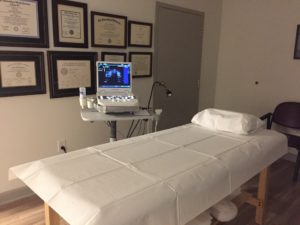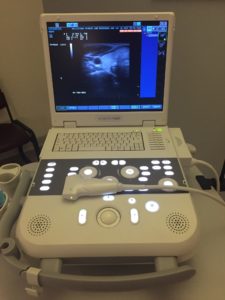Dr. Fitzpatrick and Dr. Greeley offer real-time thyroid ultrasound (performed and interpreted in person) for evaluation of suspected or diagnosed nodules. Performance of the thyroid ultrasound by the interpreting physician yields the most information for accurate assessment. It is only with real-time ultrasound that the physician may see the entire thyroid landscape, and not rely upon snapshot images alone.
We offer ultrasound-guided fine needle aspiration biopsy to determine whether nodules are benign or malignant. Our decision to biopsy is made in accordance current American Thyroid Association guidelines. No preparation is required from the patient prior to the biopsy procedure. Local anesthesia is available upon request, but the biopsy is performed with a very small needle and causes minimal pain or discomfort as reported by the majority of patients. The patient is positioned on the examining table, and the neck is sterilized with alcohol. A sample aspirated from the thyroid nodule, using ultrasound guidance, is sent to a pathologist who specializes in thyroid cytopathology, and results are available usually within a few business days. Part of the sample is reserved for mutation marker testing in the event a biopsy returns as indeterminate. This can help to avoid unnecessary surgery. We telephone our patients personally with the results and make recommendations for followup or treatment as appropriate.
The majority of thyroid nodules are benign, but a diagnosis of thyroid cancer is generally curable in most cases. We have expertise in treating all forms of thyroid cancer, and make referrals to the appropriate institutions for surgery and radioactive iodine. In the event surgery is required, we refer only to those surgeons with a solid history and regular, ongoing experience in performing successful thyroid surgeries. External beam radiation and conventional forms of chemotherapy are in most cases are not required for cure. Patients are followed closely for many years to detect cancer recurrence through laboratory studies, ultrasound and nuclear medicine studies when appropriate. Most patients receiving a diagnosis of thyroid cancer go on to lead normal, full and healthy lives.
Parathyroid Ultrasound
Parathyroid glands are commonly too small to visualize on ultrasound, but are often quite large among patients with hyperparathyroidism. In such patients, when the decision has already been made to pursue surgical excision of an abnormal parathyroid gland(s), parathyroid ultrasound enables us in many cases to pinpoint the exact location of the offending gland(s). This means the potential for a less invasive surgery, smaller scar and faster recovery time. For these reasons, many surgeons now request a parathyroid ultrasound be performed preoperatively. As with our thyroid patients, we refer our parathyroid patients to surgeons with a proven track record of successful outcomes.


